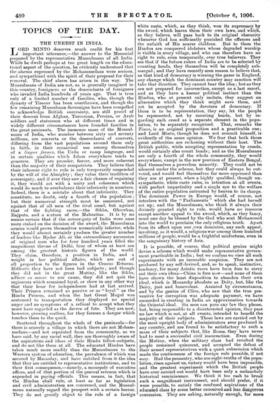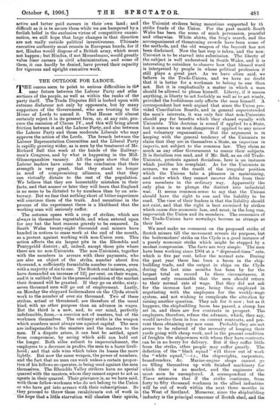TOPICS OF THE DAY.
THE UNREST IN INDIA.
MINTO deserves much ' credit for his first important utterance,—the answer to the Memorial prepared by the representative Mussulmans of all India. While he dwelt perhaps at too great length on the educa- tional aspect of the question, he evidently understood that the alarms expressed by the Mohammedans were serious, and sympathised with the spirit of their proposal for their removal. The chief alarm has arisen in this way. The Mussulmans of India are not, as is generally imagined in this country, foreigners or the descendants of foreigners who invaded India hundreds of years ago. That is true only of a limited number of families, who, though the dynasty of Timour has been overthrown, and though the few remaining Mussulman Sovereigns have been compelled to acknowledge British suzerainty, are still proud of their descent from Afghan, Turcotnan, Persian, or Arab soldiers and statesmen who at different times and in widely different circumstances have founded families in the great peninsula. The immense mass of the Mussul- mans of India, who number between sixty and seventy millions, are converts or the descendants of converts, differing from the vast populations around them only in faith, in their occasional use among themselves of a lingua franca, the Urdu or camp language, and in certain qualities which Islam everywhere tends to generate. They are prouder, fiercer, and more coherent than the majority of their compatriots. They believe that their inherent right to rule is only temporarily suspended by the will of the Almighty ; they value their tradition of sovereignty, and if ever they saw a fair chance of regaining it, they -would act with a unity and coherence which would do much to overbalance their inferiority in numbers.
• Indeed, there is a mistake about that inferiority. They constitute, no doubt, only a fourth of the population ; but their numerical strength must be measured, not against that of all men of the rival creed, but against that of the fighting races,—the Sikhs, Ghoorkas, liajputs, and a section of the Mahrattas. It is by no means certain that if the sovereignty of India were once more staked on the decision of the sword, the Mussulman armies would prove themselves numerically inferior, while they would almost certainly produce the greater number of leaders like Ryder Ali, or the extraordinary succession of original men who for four hundred years filled the magnificent throne of Delhi, four of whom at least are among the greatest historic figures of the world. They claim, therefore, a position in India, and a weight in her political affairs, which are out of all proportion to the figures in the Census Returns. Hitherto they have not been bad subjects ; and though they did not in the great Mutiny, like the Sikhs, adhere en, masse to our cause, they did not quit the regiments which remained loyal, or show in any other way that. their hour for independence had at last arrived. Their Princes remained as passive or as " loyal " as the Hindu Princes, and when the last Great Mogul was sentenced to transportation they displayed no special anger and no symptoms of a refusal to accept what they must have regarded as the decree of fate. They are now, however, growing restless, for they foresee a danger which touches them to the quick.
Scattered throughout the whole of the peninsula—for there is scarcely a village in which there are not Moham- medans—and not separated from the community, as we . have said, by any racial wall, they are thoroughly aware of the aspirations and ideas of their Hindu fellow-subjects, and do not like them at all. The educated Hindus have taken much more readily than the Mussulmans to the Western system of education, the prevalence of which was secured by Macaulay, and have imbibed from it the idea that they are entitled to representative institutions, and to their first consequence,—namely, a monopoly of executive offices, and of that portion of the general revenue which is expended in paying -officials. This means, in fact, that the Hindus shall rule, at least as far as legislation and civil administration are concerned, and the Mussul- mans naturally regard the prospect with a certain horror.
• They do not greatly object to the rule of a foreign white caste, which, as they think, won its supremacy by the sword, which leaves them their own laws, and which, as they believe, will pass back to its original obscurity whenever God has sufficiently punished the offences and the unfaith of His nearer children. But to them the Hindus are conquered idolaters whose degraded worship is visible in every village, and who can therefore have no right to rule, even temporarily, over true believers. They see that if the future rulers of India are to be selected by counting heads, they themselves will be completely sub- merged; and they have recently seen reason to believe that, as that kind of democracy is winning the game in England, any change which the dominant country may sanction will take that direction. They cannot bear the idea ; but as they are not prepared for insurrection, except as a last resort, and as they have a keener political instinct than the Hindus, who at present only imitate, they suggest an alternative which they think might save them, and yet be accepted by the devotees of democracy. If there is to be representation, they say, let the people be represented, not by counting heads, but by re- garding each creed as a separate element in the popu- lation, to be separately recognised. That, remarks the Times, is an original proposition and a practicable one; and Lord Mints, though he does not commit himself, is evidently of the same opinion. We fear that both those great authorities are reckoning without their host. The British public, while accepting representation by creeds, would certainly also count heads ; and as the Mussulmans are only a fourth of the whole community, they would everywhere, except in the new province of Eastern Bengal, find themselves a powerless minority. They could not be silenced under the scheme, but they could always be out- voted, and would feel themselves far more oppressed than they are at present, when a highly qualified, though' un- sympathetic, white caste rules, in intention at all events, with perfect impartiality and a single eye to the welfare of the entire population entrusted by heaven to its charge. The dominant Power in Europe would, of course, not interfere with the "Parliaments" which she had herself set up ; and the Mussulmans, who think it always their divinely gra,uted right to rule, would have no resource except another appeal to the sword, which, as they fancy, must one day be blessed by the God who sent Mohammed into the world to proclaim the only religious truth. Apart from its effect upon our .own dominion, any such appeal, involving, as it would, a religious war among three hundred millions of people, would bea frightful misfortune, even in the sanguinary history of Asia.
It is possible, of course, that political genius might -devise a scheme which would make representative govern- ment practicable in India ; but we confess we view all such experiments with an incurable suspicion. They are not produced by any self-derived, and, so to speak, instinctive, tendency, for many Asiatic races have been free to carry out their own ideas—China is free now—and none of them have shown the least disposition to abandon their own ideal, which is Monarchy absolute as Deity, but, like the Deity, just and benevolent. Assisted by circumstances, and by the genius of 'Clive, who Saw that the true pre- ventive for corruption was adequate payment, we have succeeded in creating in India an approximation towards the Oriental ideal. Six men can pass any law they please, but, being responsible to a disinterested opinion, they pass no law which is not, at all events, intended to benefit the majority of their subjects. Those laws are carried out by the most upright body of administrators ever produced in any country, and are found to be satisfactory to such a mass of their subjects that, like Rome, they have never had to meet a successful civil insurrection. Even during the Mutiny, when the military class had revolted the people remained quiescent, and accepted the defeat of their armed representatives with a quiet submission which made the continuance of the foreign rule possible, if not easy. Had the peasantry, who are eight-tenths of the popu- lation, risen against us, victory would have been impossible, and the greatest experiment which the British people have ever carried out would have been only a melancholy historical reminiscence. We think it too rash to break such a magnificant instrument, and should prefer, if it were possible, to satisfy the confused aspirations of• the educated class by some better conceived and less dangerous concession. They are asking, naturally enough, for more
active and better paid. careers in their 'own land ; and difficult as it is to secure them while we are hampered by a foolish belief in the exclusive virtue of competitive exami- nation, we still hope that large changes in that direction are not really outside political inventiveness. Ultimate executive authority must remain in European hands, for if not, Hindus would dispose of a British army, which must not happen ; but Hindus, if not Mussulmans, would greatly value freer careers in civil administration, and some of them, it can hardly be denied, have proved their capacity for vigorous and upright executive work.































































 Previous page
Previous page